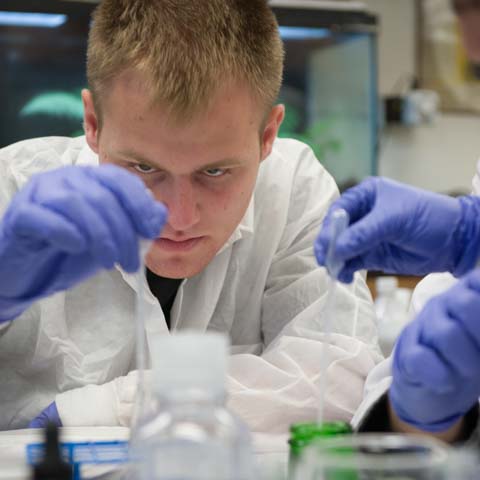Biological Sciences
Degree Options: Major, Minor
Locations: Rose Hill
Visit the Biological Sciences Department
Read the story of life on Earth as it’s written in our molecules, cells, creatures, and environment.
 What is life, at the fundamental level? What is its infrastructure? How do its mechanisms and processes work? We ask big questions in Department of Biological Sciences at Fordham. You learn the answers in the class, in the lab, and on site at several of New York City’s leading scientific institutions.
What is life, at the fundamental level? What is its infrastructure? How do its mechanisms and processes work? We ask big questions in Department of Biological Sciences at Fordham. You learn the answers in the class, in the lab, and on site at several of New York City’s leading scientific institutions.
Our courses provide a broad basis for understanding life at the molecular, cellular, organismal, and ecological levels. You’ll study the web of life—and tease out its individual strands in one of our hands-on, high-tech labs or research centers.
Of course, you’ll learn more than biological sciences here. You’ll also study philosophy, theology, economics, mathematics, languages, and the performing arts through Fordham’s common core curriculum, the centerpiece of our liberal arts education.
-
Our formal affiliations provide opportunities for on-site study with doctors, researchers, and technicians at:
- Albert Einstein College of Medicine
- Montefiore Hospital
- New York Botanical Garden
- Wildlife Conservation Society (Bronx Zoo) FC
Larkin Hall is a state-of-the-art, 27,000-sq.ft facility housing 16 modern laboratories equipped with modern technologies for research in:
- Cell and molecular biology
- Entomology
- Cytogenetics
- Ultrastructure
- Microbiology
- Neurobiology
It also holds an animal care facility.
We have three research centers:
- At the Center for Urban Ecology, you can study the intersection of nature and the city with scientists researching the impact of urbanization on regional ecosystems and the role people play in physiological, ecological, and evolutionary processes.
- At the Center for Cancer, Genetic Diseases, and Gene Regulation, you’ll get an up-close view of molecular cancer research. The center nurtures the development of next-generation scientists researching the molecular basis of certain diseases—and developing treatments for them.
- At the Calder Center Biological Field Station, a 114-acre expanse of forest, lakes, and wetlands in nearby Armonk, N.Y, you can take ecology classes and conduct field research alongside a selected number of biologists who focus on water management and conservation for government and industry.
When you get to be a junior or senior, you’ll have the opportunity to write a thesis based on laboratory or field research.
If you’re especially self-directed—ambitious, committed, eager to be in the driver’s seat—our faculty can help you design an individualized program tailored to your needs and strengths.
Apply yourself. You can earn a master’s in biology in five years at Fordham.
-
General Genetics Lab
Ecology
Human Anatomy Lab
Biochemistry
Microbiology
Cancer Biology and Signaling
Neuroscience
Animal Behavior -
Want to sequence a genome? Create a breakthrough medicine? Become a big-animal veterinarian? Our program provides a strong foundation for graduate studies or a career in:
- Medicine
- Dentistry
- Veterinary medicine
- Research
- Industry
- Forensics
- Teaching
Learn More About Biological Sciences
Visit the Biological Sciences Department
E-mail us
- General: [email protected]
- International: [email protected]
- Transfer Students: [email protected]
- Financial Aid: [email protected]
- Find your admission counselor
- Information for counselors
Visit and Chat with us
- Schedule a Visit: [email protected]
- Chat with our student ambassadors
Connect with us on social media
- Follow us on Instagram
Request Information